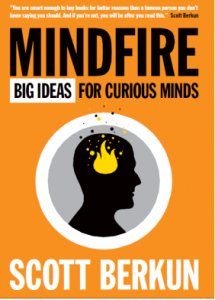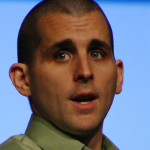 Although this blog focuses a fair amount of attention on blogging books to get “discovered” by literary agents and acquisitions editors at traditional publishing houses, there’s just as much value in blogging a book—or simply blogging—to create the audience you need to produce a successful self-published book. No one knows this better than someone who has done both: produced a traditionally published book and a self-published book.
Although this blog focuses a fair amount of attention on blogging books to get “discovered” by literary agents and acquisitions editors at traditional publishing houses, there’s just as much value in blogging a book—or simply blogging—to create the audience you need to produce a successful self-published book. No one knows this better than someone who has done both: produced a traditionally published book and a self-published book.
The publishing world continues to tell stories of successful traditionally published authors who have opted to self-publish. Today, this blog features a similar story—only in this case Scott Berkun, the bestselling author of Making Things Happen, The Myths of Innovation, Confessions of a Public Speaker, not only decided to try his hand at indie publishing but to do so with a booked blog.
Scott blogs about ideas and how they work at www.scottberkun.com. His newest book, Mindfire: Big Ideas for Curious Minds, is a collection of 30 provocative essays from the blog. It has also been described as a “best-of collection of provocations and entertainments guaranteed to make you think and smile while you learn to find passion, think free, manage time, pay attention and more.”
Given that Scott knows a lot about ideas, you’ll find his ideas about booking his blog quite interesting.
What process did you use to find or choose the blog posts that went into your book?
Having read many essay collections on different themes, I knew I needed a strong theme—I chose provocations. My blog has 1,300 posts at the time, and the plan was to pick 30 that took on big questions, big ideas and were most challenging for readers.
How did you then organize them, or did you keep the flow that you originally constructed?
The original flow was irrelevant to new readers, so I abandoned that right away. I made a long list of candidates and tried to pace the book so it balanced shorter posts with longer ones. Posts that were more accessible tended to be closer to the front, and posts that were longer and more involved were towards the back of the book.
What percentage of your book ended up repurposed posts as opposed to new content?
One hundred percent was repurposed. The original plan for the book was to be 2/3rds repurposed and 1/3rd new, but by the time the outline was put together the new essays didn’t seem necessary.
What kind of editing did you need to do to make the blog posts work in a book? Did you need to add transitions, revise for flow from one post to the next, rewrite because of the different timeline, etc.?
Having written three other books before, I had a clear plan for editing. I enlisted several readers from my blog to read early drafts and give feedback on the order, flow and other high-level editing concerns. I also hired a professional editor for similar guidance. Most posts were revised, but the revisions were light—more for consistency and clarity of the individual posts than anything else.
For proofreading I hired a professional but also used my blog readers to help find issues. We divided up the book into pieces and had volunteers finding typos in each section.
How much editing was necessary to complete your booked blog and make it flow? Did you run into any problems particular to booking a blog?
The ordering of the posts was the most important consideration. Having read many books of essays (which is the pre-web equivalent of a book based on a blog) I understood how much room there was in a book to change subjects between chapters. Flow means many different things. I didn’t think it was required that each chapter be followed by a similar topic. All that mattered is when the reader finished one chapter and turned the page that what they found there was something they wanted to read. Juxtaposition can have power if done right.
Did you take your readers input (comments) into account before the manuscript went to press. How did comments affect the final version of the book?
Yes. A team of volunteers were involved through the entire process. I also used my blog to let readers vote on the title, to help pick the book cover design, and more.
How did booking your blog make you a better writer?
It didn’t improve my writing skills, but it did verify there is no excuse for not writing a book. The process of self-publishing posts from my blog was so straightforward, I see now any idea I have for a book is possible—I just have to be willing to put in the time.
Did booking your blog make you a better blogger (and how)?
It helped me see how interested people are in contributing. Since it was self-published I controlled everything, which let me try giving more influence to my readers. For future books I expect to continue this.
What advice would you offer to aspiring writers who might want to turn their blogs into books or blog a book?
Most of your fears are unfounded. If you have a dream you owe it to yourself to put in the hours to make it real. All you need is to direct your time and energy in the right way. If you think long term, which you should, the sooner you make a book of any kind, the sooner you’ll learn what you need to write the second book and the third and more.
Do you have any tips you can offer on blogging books or booking blogs?
Read. Study other books that do what you are trying to do. What did they do well? Where did they fail? You are far from the first person to try this and you owe it to yourself to learn as much as possible from what is already out there.
What one thing did you do that increased your traffic or brought in more unique visitors?
It’s bogus to hope for a single thing to boost traffic. The easiest traffic wins are the shallowest. You want to build a community and to do that means personal attention to people’s comments on your blog, responding to their questions, and visiting other blogs like yours and being a sincere contributor. If you write well and often, nurture your readers, and earn the trust and respect of other bloggers like you, you’ll have strong traffic that will grow gradually over time.
How long did it take for you to gain blog readers, and can you pin point any certain event that created a tipping point when readership increased noticeably?
My story is slow and steady, which is the story for most successful bloggers.
Why did you decide to go the indie route?
I’d written three bestselling books with a publisher. I wanted to learn what I didn’t know about publishing and the only way to do that was to self-publish something. I’d often thought of doing a “best of” type book and it made perfect sense to use that project.
What’s the most important thing a blogger can do to get noticed in the blogosphere and build an author platform or fan base?
Write well. Write often. Build authentic relationships with other bloggers. Think long term.
About the Author
 Scott Berkun is the bestselling author of Making Things Happen, The Myths of Innovation, Confessions of a Public Speaker, and Mindfire: Big Ideas for Curious Minds. He is a writer and speaker and his work has appeared in the New York Times, The Washington Post, Forbes, The Wall Street Journal, The Economist, The Guardian, Wired magazine, The Huffington Post and other media. He runs a popular blog at www.scottberkun.com and is on twitter at @berkun.
Scott Berkun is the bestselling author of Making Things Happen, The Myths of Innovation, Confessions of a Public Speaker, and Mindfire: Big Ideas for Curious Minds. He is a writer and speaker and his work has appeared in the New York Times, The Washington Post, Forbes, The Wall Street Journal, The Economist, The Guardian, Wired magazine, The Huffington Post and other media. He runs a popular blog at www.scottberkun.com and is on twitter at @berkun.

[…] Traditionally Published Author Self-Publishes a Booked Blog […]